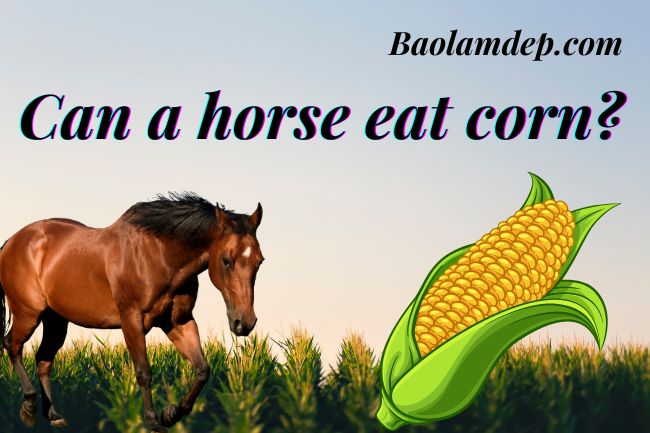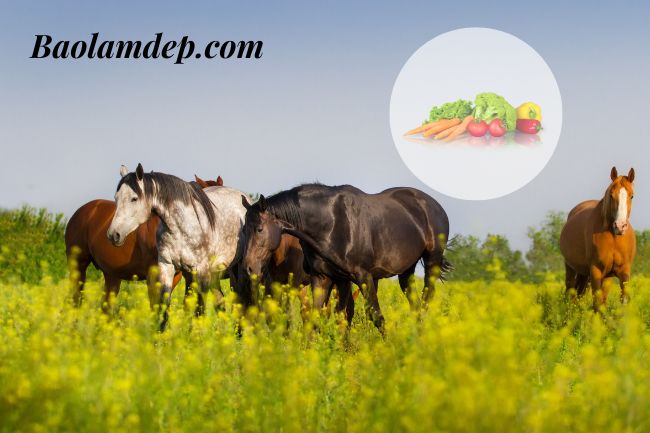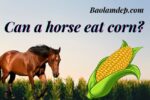Can horses eat corn? This question often arises when considering the dietary needs of horses. In this article, we will explore the suitability of corn for horses, examining its nutritional composition, potential benefits, and possible risks. By understanding the facts, we can make informed decisions about including corn in our equine friends’ diets.

1. Can horses eat corn?
Yes, horses can eat corn, but it should be fed in moderation and with certain considerations. While corn is a common ingredient in livestock feed and some horse feeds, it is not an essential part of a horse’s natural diet. Corn is high in starch and carbohydrates, which can be difficult for horses to digest and may lead to digestive issues such as colic or laminitis. It is important to properly process or cook corn before feeding it to horses to improve its digestibility. Additionally, corn should not replace the primary forage sources in a horse’s diet. Consulting with a veterinarian or equine nutritionist is recommended to determine the appropriate amount and form of corn to feed your horse based on their specific dietary needs and health conditions.
2. Understanding the dietary needs of horses
Horses are herbivores with a natural diet that primarily consists of forage. Their digestive system is designed to efficiently process fibrous materials like grass and hay. Providing horses with appropriate nutrition is crucial for their overall health and well-being.
2.1. Natural diet of horses
- Horses are grazers and naturally spend most of their time foraging on grass in open pastures.
- Their digestive system is adapted to break down fibrous plant material through fermentation in the hindgut.
2.2. Role of forage
- Forage, such as high-quality grass and hay, should form the foundation of a horse’s diet.
- Forage provides essential nutrients, including fiber, vitamins, and minerals.
- It promotes proper digestion, supports dental health, and helps maintain a healthy weight.
2.3. Grains and concentrates
- Grains, such as corn, oats, and barley, can be included in a horse’s diet in limited amounts.
- They are a concentrated source of energy and can supplement the horse’s caloric needs, especially for working or performance horses.
- However, grains should be fed in moderation and balanced with forage to prevent digestive disturbances.
2.4. Importance of supplements
- Supplements may be necessary to ensure horses receive specific nutrients not adequately provided by forage or grains.
- Common supplements include vitamin and mineral mixes, omega-3 fatty acids, and joint support supplements.
- Supplements should be chosen based on the horse’s individual needs and in consultation with a veterinarian or equine nutritionist.
Properly understanding the natural diet of horses and providing them with a well-balanced combination of forage, grains (if necessary), and appropriate supplements is essential for meeting their nutritional requirements and promoting their overall health and performance.
3. Nutritional Composition of Corn
3.1. Overview of the nutrients found in corn
- Corn is rich in essential nutrients such as carbohydrates, protein, fats, and fiber.
- Carbohydrates in corn are the primary source of energy and provide necessary fats for basic bodily functions in horses.
- Protein found in corn helps maintain muscle, bone, and other tissue development.
3.2. Potential benefits of corn for horses
- Corn provides quick energy for horses, especially during enhanced activities or heavy workloads.
- The fats in corn supply sustained energy and support the absorption of fat-soluble vitamins.
- The fiber in corn may assist with digestive function and maintain the stability of the horse’s digestive system.
However, the use of corn in a horse’s diet should be carefully considered and adjusted.
4. Feeding Corn to Horses
4.1. Precautions and considerations before feeding corn
- Check for any allergies or sensitivities that horses may have to corn.
- Introduce corn gradually to the horse’s diet to avoid digestive disturbances.
- Consult with a veterinarian or equine nutritionist to ensure corn is suitable for the horse’s specific needs.
4.2. Recommended forms and preparations of corn for horses
- Whole corn can be difficult for horses to digest, so it is often recommended to process or cook the corn.
- Options include cracked, rolled, or steam-flaked corn for improved digestibility.
- Cornmeal or corn-based feeds specifically formulated for horses are also available.
4.3. Proper serving sizes and frequency
- Serving sizes of corn should be determined based on the horse’s weight, activity level, and overall diet.
- It is important to avoid overfeeding corn as it can lead to weight gain, digestive issues, or imbalances in the diet.
- Work with a knowledgeable equine professional to establish the appropriate amount of corn to include in the horse’s ration.
Remember to always monitor the horse’s health and well-being when introducing new foods, including corn, into their diet.
5. Risks and Concerns
5.1. Digestive issues associated with feeding corn
- Corn can cause digestive problems in horses, such as indigestion, constipation, or bloating.
- Transitioning from the current diet to a corn-based diet should be done gradually to minimize the risk of digestive disorders.
5.2. Potential health risks and complications
- Corn can contribute to weight gain and elevated blood sugar levels, increasing the risk of diabetes.
- Some horses may have sensitivities or allergies to corn, resulting in symptoms like itching, skin inflammation, or hives.
5.3. Monitoring for any adverse effects
- Observe any changes in the horse’s eating behavior after introducing corn to their diet.
- Take note of any discomfort, digestive disturbances, or changes in health that may occur.
- If any serious issues arise, consult a veterinarian for appropriate advice and treatment.
Careful observation and timely response to any issues will help ensure the health and well-being of the horse when feeding corn.

6. Alternatives to Corn
6.1. Healthier grain options for horses
- Oats: Oats are a popular grain choice for horses due to their high fiber content and lower starch levels compared to corn.
- Barley: Barley is another grain option that provides energy and nutrients without the high starch content found in corn.
- Wheat: Wheat can be included in a horse’s diet but should be fed in limited amounts due to its higher starch content.
6.2. Variety of feed options to meet nutritional needs
- High-quality forage: Providing ample amounts of good-quality hay or pasture should be the foundation of a horse’s diet.
- Complete feeds: These commercially available feeds are formulated to provide a balanced and complete nutrition profile for horses.
- Supplements: Depending on the horse’s specific needs, adding supplements like vitamins, minerals, or targeted nutrients can help meet their nutritional requirements.
It is important to consult with a veterinarian or equine nutritionist to determine the best alternatives to corn based on the horse’s individual needs and dietary requirements.
In conclusion, while the question “Can horses eat corn?” The answer is it should be fed with caution and in moderation. Understanding their nutritional needs and consulting with experts will help ensure the safety and health of our equine companions. Whether corn is included in their diet or alternatives are chosen, proper care and balanced nutrition should always be prioritized for the well-being of our horses. We hope the article on Baolamdep.com provides you with valuable information.
